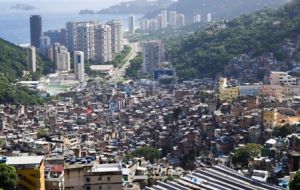MercoPress. South Atlantic News Agency
Infrastructure loan to improve living conditions in Rio do Janeiro’s favelas
 The city of Rio is surrounded by favelas
The city of Rio is surrounded by favelas Rio de Janeiro, Brazil’s second biggest city will receive a 150 million US dollars loan from the Inter-American Development Bank (IDB) to improve living conditions in low-income neighborhoods, known as favelas.
The IDB will help finance public works to improve water and sewerage services, drainage systems, road surfacing, street lighting, the provision of green areas, sports fields, and recreational areas, and the construction and equipping of social service centers. The program will target 30 favelas and six unregulated settlements and it is expected to benefit 100,000 people.
“With its ambitious Morar Carioca initiative, Rio has set itself the goal of fully integrating and upgrading the city’s low-income neighborhoods by 2020,” said IDB President Luis Alberto Moreno. “This effort builds on the pioneering Favela-barrio program that the IDB is proud to have supported and which we are now helping to replicate in other large Latin American cities that are committed to social inclusion and a better quality of life.”
The Bank will support social programs to reduce violence, drug use and improve job prospects, particularly for the most vulnerable families and young people. The project will support the regularization and control of urban development in the favelas, including property regularization and the prevention of community expansion.
The project will also support the implementation of a pilot project on citizen security, whose goal is to promote actions that reduce factors associated with violence and improve security conditions for community residents. The pilot project will eliminate dark and isolated areas, open public squares; promote campaigns to discourage drug use and domestic violence; as well as introduce community guards and activities to set up community networks.
“Security has become the number one concern of people in many of our cities,” President Moreno added. “Rio is generating path-breaking solutions to this problem by integrating infrastructure improvements with new approaches to law enforcement and preventive activities like organized sports that create safe alternatives for young people.”
Rio do Janeiro will be hosting the 2016 Olympics and will also be one of the several cities where the 2014 World Cup is to be disputed. The Rio state government, with federal support has begun the task of clearing the favelas of crime organizations and was recently involved in a several-days battle to take hold of one of the most notorious holdouts of drugs related gangs.




Top Comments
Disclaimer & comment rulesCommenting for this story is now closed.
If you have a Facebook account, become a fan and comment on our Facebook Page!